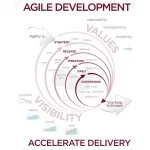From Consulting to Coaching, what’s the difference for the client?
“An expert is a man who has made all the mistakes which can be made, in a narrow field.” Niels Bohr
In order to resolve complex problems, organisations often hire experts for help.
When I am such expert, very early in the engagement I explain how I can help resolve the problem they have in a few different ways.
What I tell them is that I can provide my service at three different levels:
- Coaching, where I help the people i coach ask the right questions, find the answers within themselves and resolve the problem.
- Mentoring, where I use a combination of coaching, training and also offer some options that might help resolve the problem .
- Consulting, where I either solve the problem as individual contributor (doing) or give instructions in order to solve the problem (telling)
The idea is that the paying client will decide what service level he requires, but the decision is not very straight forward if I only provide the three definitions above.
Lately I have found useful using a new approach (new to me) to help my clients make the right choice. With this approach, I show the impact of each of the different levels of service on “things” paying clients care about.
I use three simple visualisations, if you think they can help you, feel free to use them. If you have another interesting visualisation you found useful, please share it with me.
Future dependence on my service
Through this view the client will be able to see how one approach is going to create a dependence on my service to be continued in the future, while the opposite is going to remove completely the need for my service. This is useful for clients to verify what fits better with their long term strategy on dealing with problems similar to the ones I am helping resolve.
Time to Resolution:
Through this view I highlight the impact of the approach on the time that it will take to resolve the problem I have been hired for. This will help the customer make a decision based on the urgency of the problem. The more urgent the more to the left we will go.
Resistance to Change
This view in my opinion is extremely important because it is not always obvious to my clients but has massive impact on the organisation’s ability to deal with the result of my work.
If I am a specialist working on my own (doing) i won’t have any resistance as I am the one that is changing to resolve the problem. If I have to tell other people how to change to resolve a problem by giving instructions (telling) I am very likely going to be told “go away!”. If I exercise power to apply the change, things won’t be much better as people will do what I say but on a spectrum from unhappy compliant to angry saboteur. If I help people find the right way to change for the better, I will acquire many allies that will be invested in making change happen and most importantly sustain it in the long run.
| Published on Java Code Geeks with permission by Augusto Evangelisti, partner at our JCG program. See the original article here: From Consulting to Coaching, what’s the difference for the client? Opinions expressed by Java Code Geeks contributors are their own. |





